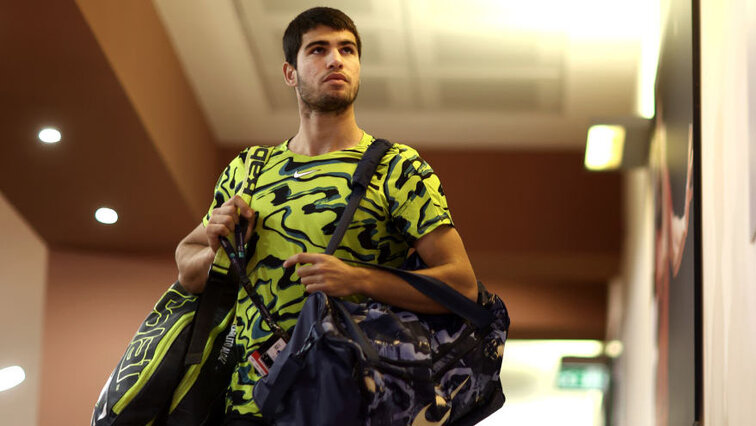Carlos Alcaraz and the joy of playing
Carlos Alcaraz is probably going to be the big favorite for the French Open 2023. But if you take away the Spaniard's enthusiasm for the game, then Alcaraz is also vulnerable. You saw that in Rome. Tennis insider Marco Kühn analyzes ...
by Marco Kühn
last edit:
May 23, 2023, 10:03 pm

His right hand gripped the racquet at the heart of the racket. With his left hand he supported himself on the net. With his head hanging, resigned and almost helpless, he looked in the direction of the coaching box after a perfect stop ball by his opponent Fabian Marozsan. A look that you've almost never seen from Carlos the happy one in the last two years.
Alcaraz was robbed. The young Hungarian managed to eliminate Alcaraz's greatest strength in the game: enthusiasm.
What is joy of play?
A clever stop ball against the running direction of the opponent. Chip n Charge, combined with a strong volley stop directly behind the net. A forehand, played inside-out, directly into the corner of the opponent's T-field. Ideally played with so much topspin that it jumps out of the field.
The joy of playing has its origin in playful creativity. A player with pure joy of playing plays tennis free of fears and doubts, which he has almost dreamily gone through off the court in his ideal vision. "Dream tennis" if you will. The joy of playing is the direct opposite of an insecure player who is afraid of having to hit the ball. A gambler who thrives on the joy of playing plays to win. An unsure gambler plays not to lose.
Why is joy in playing important for Carlos Alcaraz?
Yes, you already guessed it. Carlos Alcaraz lives from his enthusiasm for the game. From this ease in his game. He seems to have a button in his head that just shuts off all negative thoughts. As if he had a remote control with which he can switch to the "Traumtennis TV" channel at any time. I remember the Madrid final against Jan-Lennard Struff. Alcaraz was behind with a break, Struff played at the limit and Carlos, in return, was weak for his standards - and Carlos smiled. He was having fun, which is always dangerous for the opponent. It doesn't matter what the score says.
And indeed it turned out as one might have guessed. Struffi couldn't break Alcaraz's joy in playing. Carlos placed dream stops behind the edge of the net, shot unreachable forehands just before the baseline and unnerved Struff with excellent returns on the tactically clever serve-and-volley game.
Did Struff do a lot wrong in this match? Definitely not. He could proudly march off the court without blaming himself. Then it was a young player from Hungary who was to break this unique strength in Alcaraz's game, this pure joy of playing.
How did Marozsan destroy the joy of playing at Alcaraz?
The commentator on Tennis TV put it in a nutshell: "Marozsan was the better Alcaraz today!". What exactly did he mean by that? Fabian Marozsan played the kind of tennis that made Alcaraz number 1: strong serves, powerful forehands, nimble feet and stops. In short: Marozsan showed more enthusiasm than Alcaraz.
In some rallies it almost seemed like comedy. As if Marozsan wanted to tease Carlos the happy one a little. Alcaraz, who likes to be in the front row on the return, didn't stand a chance against many of the well-timed stops. Marozsan scored as he wanted. It seemed as if he had stolen the remote control from Alcaraz and turned on the "Traumtennis TV" channel.
Almost more interesting than the match during the rallies was the match between the rallies.
Alcaraz was robbed of his smile. Marozsan, on the other hand, showed the mental quality that is a building block to success in such matches. At no point in the match was the young Hungarian too euphoric or too negative. He always seemed to think and play "in the now". In return, something changed at Alcaraz. A hallmark of his body language is the confident nod towards the trainer box. Marozsan, the thief of the joy of playing, caused the direct opposite with his play style. Alcaraz shook his head at the coach box.
The result of this mental game was the tie break of the second set. Just when you thought Carlos was turning the match, the direct opposite happened again. Fabian Marozsan worked from a 1:4 deficit in the tiebreak into a 7:4 to win the match.
Conclusion
Sure: The probability that Alcaraz will win the next duel between these two players is high. But there are still some lessons to be learned from this sensation.
Here are three of those teachings:
1) Drop shots break not only the playful, but also the mental rhythm of the opponent. However, the stops have to be really, really good. Otherwise the story will backfire
2) A player's inner state of mind has a direct impact on their performance in the match
3) Staying cool and focused is more important than playing perfect in every rally. Mistakes are part of every match. What matters is how you react to these errors
And finally: We currently have more strong, young players in tennis than we have in a long time. We can look forward to many great matches with some surprises.
